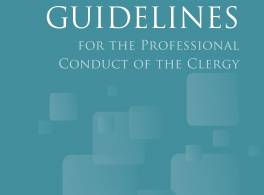General Synod
1. At its meeting on 30 September the Archbishops’ Council considered what advice to offer to the Convocations on its treatment, in the proposed revision of the Guidelines for the Professional Conduct of the Clergy, of the ministry of absolution for which provision is made in Canon B 29. The Annex to this paper sets out the background to the revision process.
2. The Working Party preparing the revised draft of the revised Guidelines on behalf of the Convocations proposed that the section dealing with “Reconciliation” should, amongst other matters, describe the current legal position in relation to the formal ministry of absolution.
3. The legal position in that respect is governed by the unrepealed proviso to Canon 113 of the Code of 1603, which reads as follows:
“Provided always, that if any man confess his secret and hidden sins to the minister, for the unburdening of his conscience, and to receive spiritual consolation and ease of mind from him; we do not in any way bind the said minister by this our Constitution, but do straitly charge and admonish him, that he do not at any time reveal and make known to any person whatsoever any crime or offence so committed to his trust and secrecy (except they be such crimes as by the laws of this realm his own life may be called into question for concealing the same), under pain of irregularity.”
4. This is the one provision of the 1603 Code which was not repealed as part of the complete overhaul of the Canons of the Church of England in the 1950s, which led to the present Code being enacted by the Convocations in 1964 and 1969.
5. The effect of the proviso is that, where the formal ministry of absolution as described in Canon B 29 is sought, if the penitent makes a confession with the intention of receiving absolution, the priest is forbidden to reveal or make known to any person what has been confessed. That requirement of absolute confidentiality applies even after the death of the penitent.1
6. The Archbishops’ Council recognized that the practice of the ministry of absolution has a well-established place in the life of the Church of England, playing an important part in the spiritual life of some of its members and representing a significant aspect of the ministry of some of its clergy.
7. However, the Council also recognized the responsibility of the Church to protect children and vulnerable adults from harm, and the force of the argument that the legal framework of the Church should accordingly, in all respects, be such as to enable those who present a risk to children and vulnerable adults to be identified – both so that they can be held to account for past wrongs and be prevented from doing further harm. The Council is also aware that there has been some wider debate as to whether Parliament should legislate to make it an offence not to report evidence of child abuse to the statutory agencies.
8. The Council therefore decided to commission further theological and legal work to enable it to review, in consultation with the House of Bishops, the purpose and effect of the unrepealed proviso to the Canon of 1603, with a view to enabling the Synod to decide whether it wished to legislate to amend it. At their November meeting the Council will consider the terms of that review and who should conduct it, with a view to putting their proposals in those respects to the House of Bishops when it meets in December.
9. In the light of its decision, the Council invited the Working Party undertaking the revision of the Guidelines to consider further the section on “Reconciliation”. It has now been amended to make clear that the present law, which is explained there, is now to be the subject of a review.
William Fittall
SECRETARY GENERAL
22 October 2014
1 As is apparent from the text, the Canon allowed for an exception to the duty of confidentiality where nondisclosure could have rendered the priest himself vulnerable to prosecution for a capital offence. This provision was, however, never operative since by 1603 parliament had already legislated to abolish the common law capital offence for a person who had knowledge of a treasonous plot not to reveal the plot to the Crown. instead, it had created a statutory offence of misprision of treason, with a maximum sentence of life imprisonment.
